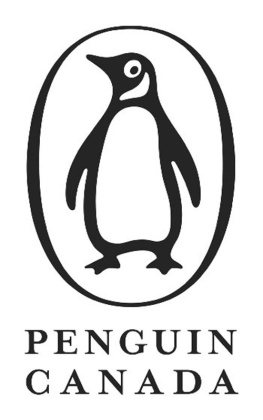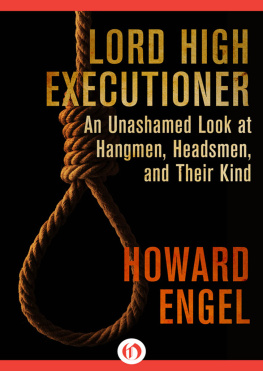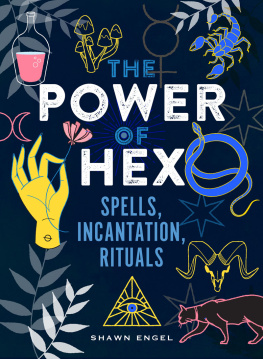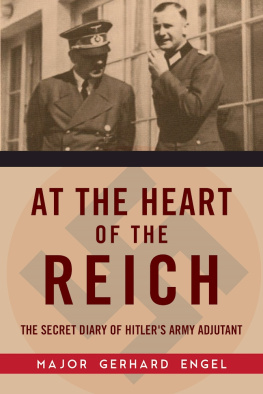The Man
Who Forgot
How to Read
HOWARD ENGEL
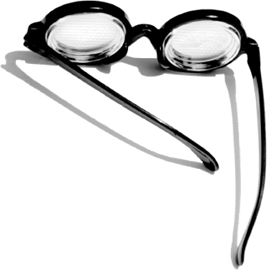

In memory of Arthur A. Hamilton and Sheldon P. Zitner
The Rev. A. A. Hamilton always encouraged me in my
work and I had often sharpened my wits on his original,
enquiring and omnivorous mind. My friend Sheldon,
known in print as the poet S. P. Zitner, stimulated me over
long lunches with his crystalline, dark wit.
Table of Contents
Much of my unassisted self I struggled through the alphabet as if it had been a bramble-bush; getting considerably worried and scratched by every letter. After that, I fell among those thieves, the nine figures, who seemed every evening to do something new to disguise themselves and baffle recognition.
Charles Dickens, Great Expectations
MY NAME IS HOWARD ENGEL . I write detective stories. Thats what I tell people when they ask me what I do. I could say Im a writer or a novelist, but that raises a false echo in my brain, so Im happier with the more modest claim of writing detective stories. Ive written quite a few of them.
Before I started writing I was a reader. I read widely, everything from the John, Mary and Peter primer of my early childhood to Corn Flakes boxes when there was nothing more inspiring handy. Ive been a reading junkie since public school. I played little baseball because I was searching with Lancelot for the Holy Grail and helping to free the widows sons from the Sheriff of Nottinghams henchmen. I came home from summer camp without a tan because of books and comic books. I was reading about astronomy before I knew where the nearest drug store was located. My universe began at Betelgeuse, not at Binders Drug Store. When I came home from university, my family didnt know how to talk to me; I was so full of books, I was no longer able to understand a request to pass the salt without a philosophical discussion on the nature of joint ownership of property or state capitalism. When I lived in Europe, and I became frustrated with my lack of fluency in French, Greek or Italian, I sought out the local English bookstore.
I was in fact a very busy fellow, writing about my home town, St. Catharines, Ontario, and turning it into the murder capital of the world. Benny Cooperman, my personal private investigator, has been successful in more than a dozen novels, several short stories, radio broadcasts and two films. His name has turned up in crossword puzzles in the Los Angeles Times. He is doing well. Or, at least, he was doing well when I, the author of his being, was stricken with a sudden stroke in 2001, which put us out of the writing business by robbing me of the thing I loved above all things: the ability to read.
This book is about the road back. About how I coped, the people who helped me along the way and how I found my road back into the mysteries of what reading and writing are all about. Its a success story, in a way, because at the end of this story I am writing again. Not only that, but I have had another Benny Cooperman book published. It is a story with palpable commercial possibilities, but that is not the reason I wrote it. For me it is much more important to look back and remember all the steps that got me where I am. I need to know that so I wont forget that there was a struggle along the way and that there was a small army of people who helped me climb all those steps.
DAVID COPPERFIELD BEGAN HIS AUTOBIOGRAPHY with a chapter called I Am Born. In this book, which is more of a memoir than an autobiography, I will not dredge up all the facts about my life the way young Copperfield did. Copperfield had a lot more trouble than Ive had and he had an amanuensis, Charles Dickens, to do his heavy lifting for him. This memoir will concentrate on a significant but short period of my life. Yet in order for you to begin that part of the story, it is necessary to know who it is that is preparing to lift some of his veils and masks.
The facts of my life are simply told: I was born in Toronto, Ontario, Canada, on the second of April, 1931, in the Private Patients Pavilion of Toronto General Hospital. My mother enjoyed telling people that. I gather that in 1931 in Toronto the Private Patients Pavilion was the place to be born. Lolly Greisman Engel, my mother, always liked to go first class. She almost always got it, too, whether she asked for it or not. According to family tradition and an album full of photographs, mostly falling from their triangular black moorings, I was a bright, active child with endless curiosity. One of the pictures shows me standing in underpantswhich would make me one and a half years old, or twostaring up the nozzle of a garden hose in our back yard.
At my birth it was found that I had an unfinished left hand. It looked more like a paw with tiny ball-like fingers. My boyhood friend Garth Dittrich used to call it My little doggie. My parents hauled me off to see the leading specialist in such things.
I think it may have been Dr. Alan Brown, the developer of Pablum, who also urged them to have another child as soon as possible in order to belay any growing sense of specialness or singularity in me. Enter brother David twenty-one months later. During my early days, my hand never bothered me. In fact, in spite of Davids presence and Dr. Brown, I did think I was special. The hand didnt keep me from any of the activities a child gets into. And I developed a normal jealousy towards the baby of the family. I still wear the scar on my thigh from trying to climb into the high chair that had been lately mine and was now Davids. I tumbled out and gouged a chunk of flesh from my leg. Despite this incident, I climbed and romped with my friends, up and down trees and across rooftops with the rest of the neighbourhood children. It was only when I became a teenager and interested in acting that my hand became a problem.
My mother, Lolly, was one of seven sisters, the family of a sewing-machine operator in the garment district of Torontos colourful Spadina Avenue, a Canadian version of New Yorks Third Avenue. My father, Jack Engel, had six assorted brothers and sisters. His younger brother, Bill, was a well-known sprinter. An Olympic hopeful, he once beat the amazing American Ralph Metcalfe. While Uncle Bill was very fast on the public track, at family picnics he was usually beaten by his sister, my aunt Hannah. My fathers high-school education had abruptly ended when he punched his football coach on the jaw. Unfortunately, the coach was also the school principal. He ended his teenage years selling womens hats throughout eastern Canada. Instead of becoming bitter, he developed an admiration for education in others.
Shortly before my birth, my father opened a ladies ready-to-wear store in St. Catharines, across Lake Ontario from his Oshawa birthplace. It was 1930 and the Great Depression was upon them. The store already had a name and a big sign out frontEdwards Womens Wearat 200 St. Paul Street, at the top of James and above the Old Canal that ran along the back of the citys main street. It was one of the best locations in town. Edwards kept the family in comfortable circumstances, sent us to summer camps, gave us holidays and put me and David through university.
My interest in the theatre began while I was still in public school, where the senior students and choir entertained the rest of us at assemblies. Edith Cavell Public School had been built across the Old Canal from the main business and residential section of the city. The school was on a tract of wasteland at the top of a gully that drained into a ravine that led to Twelve Mile Creek. The CNR station was located there, and the new (in 1930) High Level Bridge led traffic to it. On the city map our enclave was called West St. Catharines, but we knew it as Western Hill.
Next page




